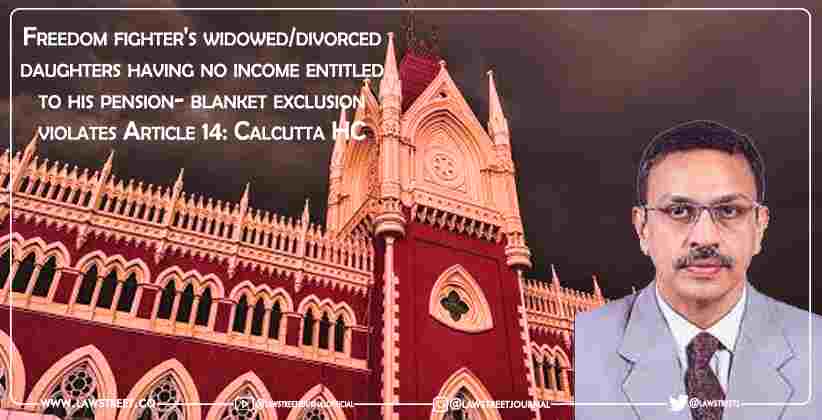The Calcutta High Court earlier this week declared Clause 5.2.5 for the guidelines for disbursement of central Samman pensions issued by the Ministry of Home Affairs, as being violative of Article 14 of the Indian Constitution. It was observed that blanket exclusion of widowed/divorced daughters, including even those who don't have any personal income in lieu of maintenance or otherwise, is patently de-hors Article 14 of the Indian Constitution, which enshrines the guarantee of equality to all citizens.
This decision was made by a single bench of justice Sabyasachi Bhattacharyya. The facts of the case are that the petitioner who is the daughter of a diseased freedom fighter was getting a pension under the scheme till the date of his demise on December 4, 2012.
The petitioner was divorced on March 19, 1999, and since then she had been staying with her parents along with her son. Due to her foregone right of alimony, she was dependent on her father. In the case of the petitioner, after the death of her father her widowed mother applied for the grant of pension however the case was kept pending for a long time and her mother died in 2019 leaving behind the petitioner and her son alone.
Clause 5.2.5 of the scheme provided that widowed or divorced daughter is not eligible for Samman pension.
According to clause 5. 2.3 in order to transfer the pension to the spouse or daughter or twin condition has to be fulfilled that is of being unmarried and having no independent source of income.
Therefore, according to the petitioner, such discretion is without any reasonable basis and violates article 14 as well as article 39 of the Constitution of India.
The Union of India submitted that widowed and divorced daughters are entitled to maintain themselves as they have been provided sufficient benefits under various other statutes which are not available to an unmarried daughter and that such classification of widowed and divorced daughter on the one hand and unmarried daughters on the other is reasonable.
According to the court, a conjoint reading of Article 14 and 39 (a)ensures that the state directs its policy towards securing such ends. The court also opined that Article 39 (d) Also ensures that there is equal pay for equal work for both women and men.
The court directed that although article 39 is a directive principle of state policy not directly enforceable by law the fundamental rights of the citizens of India or to be considered in the context of the directive principles to lend teeth to the intentions of the framers of the constitution of India.
The court also observed that clause 5.2.5 is irrational since it excludes widowed divorced daughters from eligibility.
It was observed that the object of the scheme was to honour the freedom fighters and their dependents and it should not be necessary that the term dependents under the scheme have to necessarily be in consonance of other laws such as the succession act of various religious communities.
And according to the Hindu succession act 1956, class one heirs include not only the widow but also the daughter of the deceased.
Therefore, it is clear that no line of distinction has been drawn between unmarried and divorced daughters. This ideology defies logic and cannot be intelligible in the true sense of the term.
The court also pronounced that the mere possibility of a legal remedy all an order of the court granting me a good amount as maintenance is not adequate to meet the necessities of the widowed and divorced daughters but they may also be dependent on their father being the freedom fighter in the event they do not cannot opt for taking recourse to legal remedies and do not have income sufficient to maintain themselves.
The court held that the blanket exclusion of widowed and divorced daughters including even those who do not have any personal income in leave of maintenance or otherwise is patently divorce article 14. While observing that unmarried daughters have been included within the scheme but widowed and divorced daughters who are by a neck close having no independent source of income have been excluded, the court regarded such a classification as worse than gender bias.
The court declared this scheme as ultra-vires and ordered that the scheme should include widowed and divorced daughters as eligible for this scheme provided that they satisfy the other conditions of having no independent source of income.








